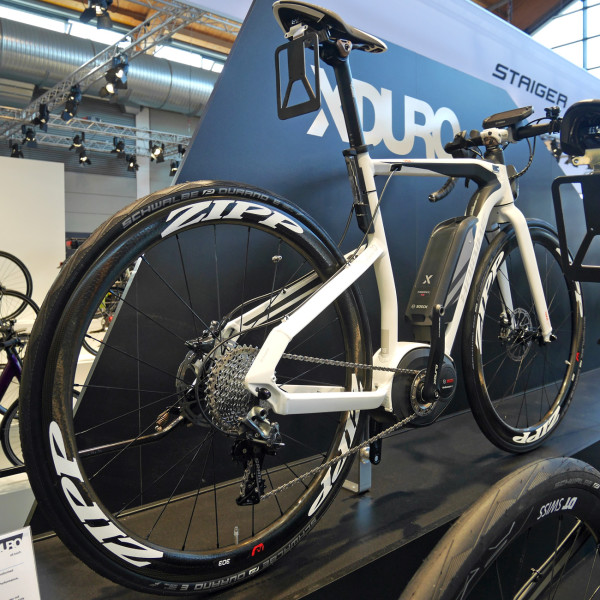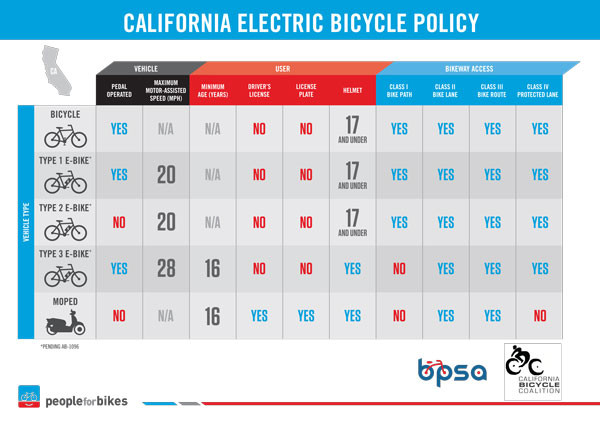
California, a state that tends to influence policy and law in many other U.S. states anytime it makes changes, has codified and legalized electric-assist bicycles for use on various paved surfaces.
Depending on how fast the bike’s assistance goes, e-bikes whose motor assistance caps out at 20mph will be allowed on bicycle paths. Those that reach 28mph of assisted pedaling will be allowed on the roads with the same rights and responsibilities as traditional cyclists. That means no more licensing and other restrictions that apply to mopeds and scooters will affect the use of e-bikes. It’s worth noting that local officials will have the final say on which paths will allow which version, but it provides a framework that many other states are likely to adopt in short order.
The bill does nothing to cover e-mountain bikes, and it only mentions to e-bikes with a pedal assist rather than a throttle that keeps you moving without any human powered input. Full PR below…
From People For Bikes:
On October 7, 2015, California Governor Jerry Brown signed A.B. 1096 (Click the link for the full text of the bill), legislation that clarifies the regulation of electric bicycles (e-bikes) in California. This new law is the result of a coordinated campaign between the Bicycle Product Suppliers Association (BPSA), PeopleForBikes, and the California Bicycle Coalition (CalBike) to refine how and where cyclists can ride electric bicycles.Assembly member David Chiu (D-San Francisco) introduced the legislation, and played an instrumental role in the bill’s success. A.B. 1096 passed the Legislature with unanimous support in both chambers and takes effect on January 1, 2016.The legislation updates California law to reflect the progression in technology around electric bicycles. The bill designates three classes of e-bikes and distinguishes lower speed electric bicycles that reach motor-assisted speeds of up to 20 miles per hour, from higher “speed pedelecs” which have motors that provide assistance up to 28 miles per hour. This class system allows the use of lower-speed e-bikes on bicycle paths, and also provides local authorities with the flexibility to regulate different types of e-bikes based on their needs.In addition to modernizing e-bike law, with A.B. 1096, e-bikes are no longer regulated like mopeds, and the same rules of the road will apply to both e-bikes and human-powered bicycles. E-bikes are also no longer subject to the registration, licensing, or insurance requirements that apply to motor vehicles.“The US bicycle industry is very pleased that Governor Brown signed AB 1096 into law,” said Larry Pizzi, Chair of the BPSA’s Electric Bicycle Committee. “We believe that these new regulations will serve as a model for many other states to follow and provide safe and appropriate access to bicycling infrastructure for the wide variety of low-speed electric bicycles that are being marketed today. From the onset of our involvement in drafting the concept for the bill, safety has been our primary concern. With a multi-class structure established, states, municipalities and land management agencies can regulate effectively and clear a path for the proliferation of electric bicycles, which we believe will provide access to bicycling for many more Americans.”The BPSA and PeopleForBikes are grateful to Assembly member David Chiu for sponsoring this legislation and his staff for successfully shepherding it through the legislature, as well as all of the stakeholders who came together in support of this bill. They would also like to thank the Executive Director of CalBike, Dave Snyder, and the entire CalBike staff for their significant contributions to this effort to get more people riding bicycles.
About PeopleForBikesPeopleForBikes is making riding better for everyone by uniting millions of individuals, thousands of businesses and hundreds of communities. Join us at PeopleForBikes.org.About the Bicycle Product Suppliers AssociationThe Bicycle Product Suppliers Association is an association of suppliers of bicycles, parts, accessories and services that leads industry initiatives in legal and governmental affairs and safety issues, is the leading resource for bicycle statistical data, and provides regular networking and educational forums for members.
